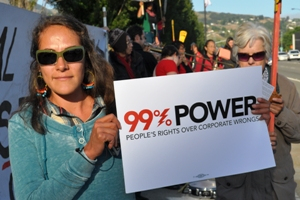Richmond sugar tax!
When Richmond residents stood up to Chevron several years ago they made national news. Richmond voters taxed Chevron and stopped them from processing heavy crude without adequate environmental protections. Today Richmond is again making national news with a proposed regressive tax on sugar drinks. On the surface, considering the obesity rate among economically challenged residents, this may look like an attempt to help people develop healthier lifestyles by slowing down their consumption of sugar drinks. Under closer inspection, however, it reveals a callous middle class bias against the poor.
The tax was authored and promoted by Richmond Council Member Dr. Jeff Ritterman, the former head of the Richmond Kaiser Cardiology Department. It is Dr. Ritterman’s current position that sugar drinks are responsible for the high rate of obesity in Richmond’s minority community and, therefore, it is in the community’s interest to discourage the consumption of such drinks by adding a hefty City tax on them. Interestingly enough, in a 2008 National Geographic Special, “Stress: Portrait of a Killer,” Dr. Ritterman expressed a broader view, stating that the daily stress of being poor is what leads to health problems. The relationship between the stress of poverty and obesity was one of the primary points in the documentary. So what could change in four years that would lead Dr. Ritterman to change his emphasis and focus exclusively on the issue of sugar drinks? I would suggest that he is leading his middle class constituency to take the reactionary position of blaming the victims and he is doing so for political reasons.
Where the poorest members of Richmond live there are no supermarkets but only liquor stores and quick-stops. This has been the case for years. Richmond has a very high rate of unemployment particularly amongst its minority population. Richmond has a high rate of drive-by shootings and homicides. Its schools are not known for their high academic performance and they have been cash-strapped for years. These are many of the daily stressors under which the poorest members of Richmond must live. As a result of these and other stressors they suffer from serious stress-related health problems. The abuse of sugar drinks is a symptom, not the cause, of these health issues which affect a large portion of Richmond’s residents. There is a proven correlation between poverty and serious health problems including obesity. You don’t need to be a scientist or a doctor to Google “what states have the highest rates of obesity?” and then Google “which are the poorest states in the US?” to see that the results indicate the very same states. Clearly, the relationship between serious health problems and rates of poverty is glaring. Health issues are class issues.
So then, why would these obvious social facts lead “progressives” to support a regressive sugar tax in the first place? The answer is that capitalism teaches us to attribute our economic problems to our own inadequacies rather than to the economic system itself. Rather than fight capitalism we blame the most oppressed members of our society. We blame them for the consequences of being poor as if it were their fault. This is the reactionary response to our problems which creates the cynicism that leads well-intentioned people to support regressive taxes.
This is precisely the same strategy that is currently being used by the media to blame public workers’ pensions and benefits for the failure of state and local governments to balance their budgets. The attacks on public workers’ benefits are merely distractions so that citizens forget the impacts of non-stop wars and the largest theft of public funds in the history of the world which we, the tax payers, are paying for.
This strategy is so effective that even the most liberal citizens are falling for it.
People who are still comfortable understand that their economic situation is changing fast. They are getting caught up in the downward economic spiral. When they are told that the increased cost of their health insurance is due to other people’s unhealthy lifestyles, they quickly support a regressive sugar drinks tax. They support increasing the health insurance rates for obese people or smokers or just denying them health care altogether. The same attitude is being applied to public workers who have paid into their retirement plans but are now under attack for having a retirement plan at all. Politicians and the media clamor for the reduction of their benefits while advocating for them to work longer before retirement. Voters who have fewer benefits or none at all are now supporting these shortsighted attacks. They don’t understand the causes of their own current economic situation. The easy answer for them is to attack their neighbor. We need to stop these mean-spirited, divisive, reactionary attacks on our friends and neighbors, focus instead on the real problem: work to defeat capitalism before it crushes all of us. Progressives should never support regressive taxes.
07-28-2012





